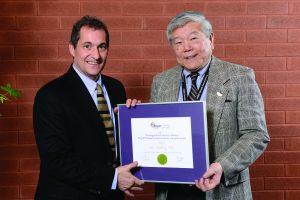It’s 1961. JFK becomes US President. The Beatles debut in London. The Russians put the first human into space. Tony Chow arrives at Brandon College—the first World University Service (WUS) Scholarship student on campus.
“I arrived in jeans and boots,” he laughs, with crisp memories of the steam ship trip from his home in Hong Kong to Vancouver, and the train ride west. “I didn’t really know what Brandon was all about, but I expected cowboy country from the literature that I had been reading.”
Dr. Chow had travelled halfway around the world to Brandon College to start his pre-medical studies. He would become one of North America’s top experts in infectious diseases, establishing one of the first accredited Infectious Disease Training Programs in Canada and creating the first Hospital Infection Control and Antimicrobial Stewardship programs in North America.

“It was always my dream to go into medicine,” says Dr. Chow, honoured in 2013 with a Lifetime Achievement Award from the Association of Medical Microbiology and Infectious Disease (AMMI) Canada, for his work as “an exemplary researcher, teacher, mentor, and leader”.
Born in Hong Kong, and educated by Irish Jesuits in a Catholic School, Dr. Chow’s family had been forced from mainland China during the Second World War. “As war refugees, we were not well off,” he says. Fortunately, Dr. Chow won the right to apply for the WUS Scholarship because of his remarkable grades.
“I placed in the top three among all students in Hong Kong at the end of my high school matriculation,” he says. “Winning that Scholarship was like winning a lottery. It really was my one chance to get into college.”
In Brandon, Chow quickly proved he was no ordinary student and was bumped to second-year courses shortly after his arrival. “Yes, I was under a microscope,” he shares. “I had been given money to attend school and I wanted to do well.”
Dr. Chow served as editor of The Quill student newspaper and absorbed local culture, courtesy of his residence room-mate, Clark Brownlee. “Clark would take me to his family farm at Souris, Manitoba, and I would see the cows and chickens and drive the tractor. It was my first rural experience and I loved it. The Brownlees became my second family.”
Dr. Chow spent two years at Brandon College before entering medical school at the University of Manitoba (U of M). “I made very close friends at BU. It was a very close-knit community, in striking contrast to medical school in a large university, where you realize that you’re just a number.”
With his wife Katherine, whom he had met at the U of M, Dr. Chow moved to southern California in the early 70s to train at UCLA in the relatively new specialty of Infectious Diseases. In 1979, he jumped at the opportunity to return to Canada, accepting a position to establish a new Division of Infectious Diseases at the University of British Columbia (UBC) and Vancouver General Hospital—a first of its kind in Canada.
“I know it sounds corny, but I wanted to pay Canada back for what it had given me,” says Dr. Chow.
On the frontlines for more than 30 years, Dr. Chow has witnessed the onslaught of emerging and re-emerging infectious diseases and outbreaks, including HIV/AIDS, SARS, superbugs, Avian Flu, antibiotic drug resistance, and Ebola Fever.
“I combined research with clinical practice, taking real live problems within the population into the lab to find solutions. I am very proud that I spent my career training future clinician-scientists.”
Dr. Chow retired from clinical practice and administrative responsibilities in 2007, yet remains engaged in the development of practice guidelines for both the AMMI and the Infectious Disease Society of America. He is Professor Emeritus at UBC and active on the Board of Directors of the Canadian Foundation for Infectious Diseases.
“I can’t say enough about the role that Brandon University played in getting me into my chosen career.”
This article first ran in the Winter 2014 issue of Alumni News, a bi-annual publication produced by the Department of Institutional Advancement.
Contact
- Brandon University
- communications@brandonu.ca
To receive any BU publication in an alternate format please contact Communications@BrandonU.ca
About BU
Success is built at Brandon University. Our growing, progressive campus welcomes a diverse and inclusive community that combines proud tradition with shared ambition. Through our excellence in teaching, research, and scholarship, we educate students to make a meaningful difference as engaged citizens and leaders. Join us at BrandonU.ca.